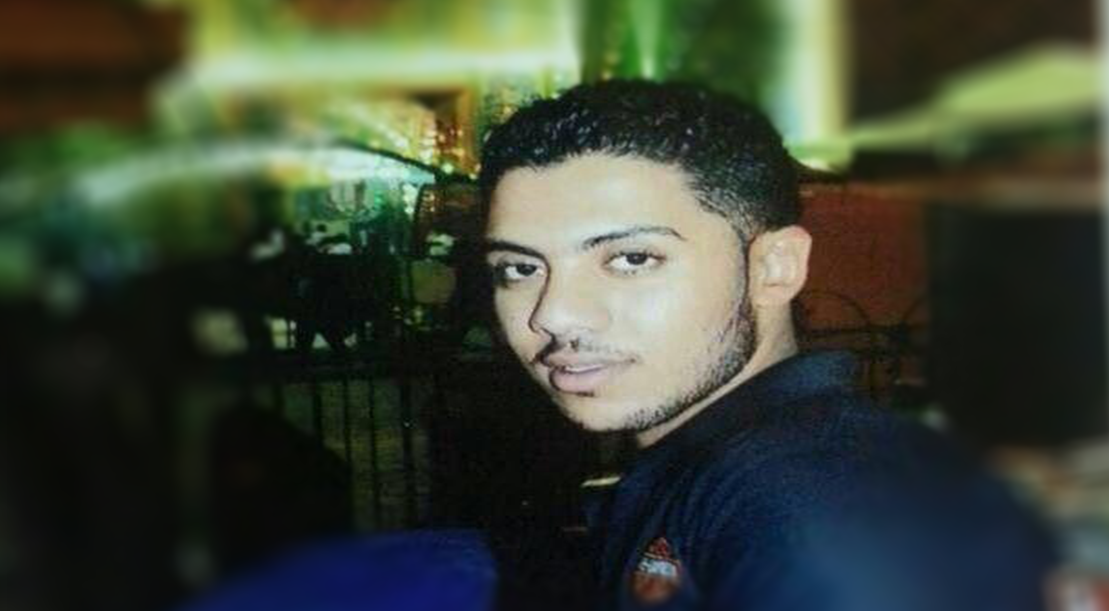Mohamed Jaafar AlDemistani was a 20-year-old assistant chef when Bahraini authorities arrested him without a warrant in May 2015. Since his arrest, Mohamed has suffered both physically and psychologically as a result of torture and ill-treatment. He remains in Jau Prison where he is serving a life sentence.
On 8 May 2015, officers in civilian clothing and a group of civilian patrols surrounded Mohamed and his friends near his friend’s house. Without presenting an arrest warrant nor providing a reason, they arrested him and two of his friends by shooting at them with live bullets after they attempted to escape.
Mohamed had been summoned twice prior to his arrest, and during the questioning he would be offered to work with authorities as an informant. Upon his refusal, officers would repeatedly call him, prompting him to change his phone number. The officers were angered by this and thus chased Mohamed for six months, also raiding his house twice over the course of two weeks
Following the arrest, Mohamed called his family for a couple of seconds and told them he was at the Criminal Investigations Directorate (CID). After that, Mohamed was forcibly disappeared for eight days; his family had no information indicating his fate or location, until he called and informed his family that he was transferred to the Dry Dock Detention Center.
During those eight days of disappearance, Mohamed was being interrogated at the CID. Officers tortured Mohamed to extract confessions from him in the absence of his lawyer. They severely beat and kicked him. Officers would burn him with cigarettes until he lost consciousness, then he would be transferred to AlQalaa Hospital and given an IV drip to regain his strength, so that he could be returned to interrogations and tortured again. This treatment persisted for the entire eight days. They also deprived him of sleep and insulted him. As a result, Mohamed confessed to taking part in the murder of the Jordanian Gendarmerie in Demistan.
Mohamed’s family was only able to visit him a month after his transfer to Dry Dock Detention Center. During their visit, they noticed visible signs of torture and some burns on his hands.
Mohamed was convicted of possession and manufacture of explosives and materials used to manufacture weapons, joining a terrorist group whose main goal is to kill policemen, and participate in the murder of the Jordanian Grandarmerie in Demistan. On 21 December 2015, he was sentenced to life imprisonment, and his citizenship was revoked. In April 2019, his citizenship was reinstated through a royal pardon. Mohamed’s fair trial rights were violated throughout the trial, as he was denied access to his lawyer, the forced confession was used against him during the trial, and the defense evidence consisting of proof that he was at work at the time of the incident was not taken into consideration. Mohamed has exhausted all means of appeal as both the Court of Appeal and Cassation Court upheld the judgment.
Since his transfer to Jau Prison, Mohamed has suffered ill-treatment and humiliation at the hands of the prison authorities. He suffers from varices in the urinary tract and pain in his legs which he is not properly treated for. There was an instance that was sparked by Mohamed saluting another inmate. When a Yemeni police officer noticed him, he brought him to an area without cameras, verbally harassed him, and threatened him with physical abuse.
As a result of neglect and poor conditions in prison following the Coronavirus outbreak, Mohamed tested positive for the virus COVID-19 in May 2021. He was suffering from shortness of breath and a high temperature and was only given vitamins as treatment. The medical team only took his temperature but did not monitor his oxygen levels or other symptoms. His family found out he was infected on 27 May through the Ministry of Health website, as Mohamed had not been in contact with them for 9 days. On the same day, he was able to call and inform them about his condition.
Bahraini authorities arrested Mohamed, without presenting an arrest warrant, they tortured him into confessing, assaulted him, and deprived him from access to his lawyer. Additionally, the authorities’ neglect and failure to contain the COVID-19 outbreak led to Mohamed contracting the virus, for which he later received minimal medical care. All these actions constitute violations of Bahrain’s obligations under the Bahraini Constitution and under international law, namely the Convention against Torture and Other Cruel, Inhuman or Degrading Treatment or Punishment (CAT), the International Covenant on Civil and Political Rights (ICCPR), as well as the Mandela Rules. ADHRB urges Bahrain to grant Mohamed a fair retrial that respects international judicial and evidentiary standards, to investigate allegations of torture with a view of holding perpetrators accountable, and to release political prisoners and prisoners of conscience such as Mohamed amidst the worsening Coronavirus outbreak.





